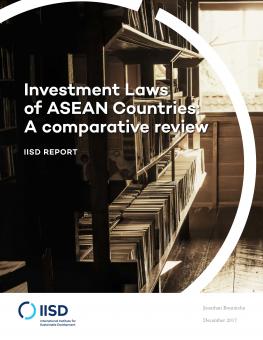
Investment Laws of ASEAN Countries: A comparative review
This report compares the investment laws of the 10 Association of Southeast Asian Nations (ASEAN) member states, focusing on basic questions relating to the function of investment laws in each country.
This report compares the investment laws of the 10 Association of Southeast Asian Nations (ASEAN) member states, focusing on basic questions relating to the function of investment laws in each country.
The main findings of the paper are as follows:
- Not every ASEAN country has an investment law. For example, Singapore, which is the most successful ASEAN country in attracting foreign investment, does not have an investment law.
- Some ASEAN countries have multiple investment laws, each with a different function. For example, the Malaysian Promotion of Investment Act deals exclusively with investment incentives, while the Thai Foreign Business Act deals exclusively with restrictions and conditions on foreign investment.
- These laws form only a small part of the legal and regulatory regime governing investment. It is impossible to evaluate a country’s investment law without considering how it fits into the wider legal and regulatory framework governing investment.
This paper also highlights fundamental differences between investment laws and investment treaties:
- Among ASEAN countries, no country’s investment law includes the combination of vague investor rights commonly found in investment treaties. For example, aside from the Myanmar Investment Law (2016), no ASEAN investment law guarantees investors “fair and equitable treatment” (FET). FET is among the most far-reaching, and widely criticized, investor rights that investment treaties grant to foreign investors. Moreover, the Myanmar Investment Law defines FET very differently from the way that investment treaty tribunals have understood that concept.
- No ASEAN country grants general consent to investor–state arbitration in its investment law. However, many ASEAN countries do allow investor–state arbitration in cases where there is a specific agreement between an individual investor and the host government—in for example, an investor–state contract—to resolve a dispute through arbitration.
Participating experts
You might also be interested in
Why the Energy Charter Treaty Modernization Doesn't Deliver for Climate
The Energy Charter Conference adopted the "modernized" Energy Charter Treaty (ECT) on December 3, 2024. IISD's Lukas Schaugg explains what the modernization does, when it will enter into force, its tension with EU law, and why the reformed ECT can still hinder climate policies.
The Responsible Agricultural Investment Tool for Agribusiness and Case Studies
This report summarizes a collaboration to support agribusinesses in complying with principles of responsible investment in agriculture and food systems.
Stabilization Clauses: The hidden provisions that can hinder tax and investment policy reform
Stabilization clauses should no longer automatically be included in contracts between states and investors. If they are, they should, at a minimum, build on the latest international standards on stabilization to avoid being a barrier to sustainable development.
What Drives Investment Policy-makers in Developing Countries to Use Tax Incentives?
The article explores the reasons behind the use of tax incentives in developing countries to attract investment, examining the pressures, challenges, and alternative strategies that exist.